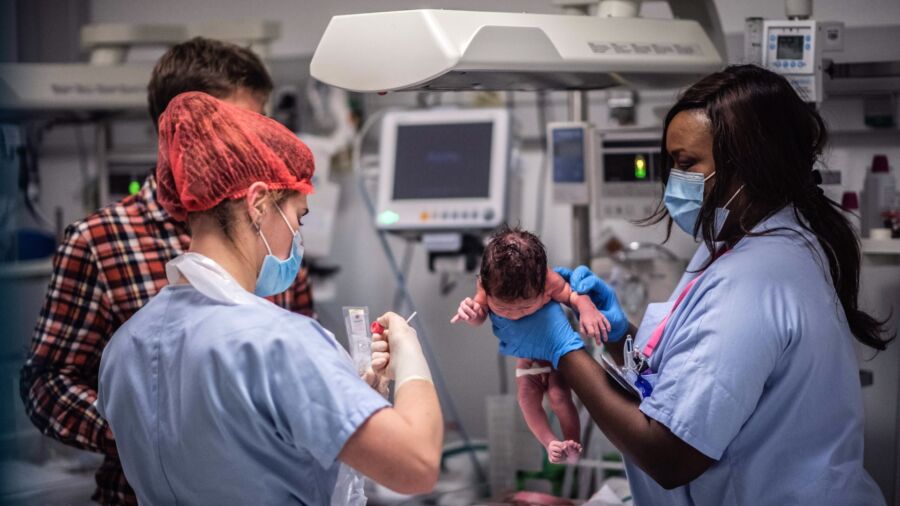A University of Miami research project found that the SARS-CoV-2 virus breached a mother’s placenta and caused brain damage to two newborn babies.
The study (pdf)—dubbed “Maternal SARS-CoV-2, Placental Changes and Brain Injury in Two Neonates”—was published in the Journal of Pediatrics on April 6 and is the first case report to confirm cross-placental COVID-19 transmission leading to brain injury in newborns.
Doctors previously had suspected this was possible, but until now, there was no direct evidence of the virus in a mother’s placenta or an infant’s brain, researchers said at a news conference this week.
“This is the first time that we’ve been able to demonstrate the virus in a fetal organ with transplacental passage,” Dr. Michael Paidas, chair of obstetrics and gynecology at the University of Miami, told the briefing. “That’s why we think this is so important.”
Dr. Shahnaz Duara, a senior co-author of the study and a medical director at Holtz Children’s Hospital, stressed in a statement that these cases of fetal brain damage appear to be very rare.
“Many women are affected by COVID-19 during pregnancy, but to see these kinds of problems in their infants at birth was clearly unusual,” Duara said. “We’re trying to understand what made these two pregnancies different so we can direct research toward protecting vulnerable babies.”
For concerned parents, the authors advise mothers who tested positive for the virus during pregnancy to inform their child’s pediatrician to check if they might be suffering from developmental delays.
“We know that things can be fairly subtle up to 7 or 8 years of age until kids go to school,” Duara said.
Case Reports
Both babies were born to young mothers who had tested positive for COVID-19 in their second trimester of pregnancy during the height of the pandemic’s spread of the Delta variant in 2020, according to the study.
Doctors found that both infants experienced seizures on the day they were born, and also had small head sizes and developmental delays. One of the infants died at 13 months of age.
However, unlike the Zika virus, the babies were not born with microcephaly, a condition marked by small head size. Instead, microcephaly developed over time as their brains stopped growing at a normal rate, the team said.
Several viruses are known to be capable of crossing the placenta and causing fetal brain damage, including Zika, Cytomegalovirus, Rubella, and HIV. The SARS-CoV-2 virus has been detected in adult brain tissue, and some experts suspected it could also damage fetal brain tissue.
“We need to continue our research to figure out why these two babies experienced such devastating results,” said Dr. Merline Benny, the study’s first author. “Once we fully understand the causes, we can develop the most appropriate interventions.”
More Details
One of the babies was born at 39 weeks to a 20-year-old Hispanic mother who had been diagnosed with COVID-19 in the late second trimester of her pregnancy but developed no symptoms from the virus, according to the paper. At the time of delivery, she again tested for asymptomatic SARS-CoV-2, as well as clinical chorioamnionitis.
At 16 hours of age, the baby girl developed clinical seizures but there was “no detectable virus or bacteria,” although later tests showed elevated levels of spike protein, inflammatory markers, and cytokines in her blood.
“She was discharged at 5 weeks of age but has had multiple hospital readmissions for breakthrough seizures and respiratory infections,” the report stated, noting that the girl is currently in hospice care when her exam at one year showed microcephaly, an abnormal neurologic examination, and significant neurodevelopmental delay.
The second woman, a 21-year-old Hispanic mother, was admitted to the neonatal intensive care unit (NICU) at Holtz Children’s Hospital at 27 weeks of pregnancy after being diagnosed with pneumonia and COVID-19. She gave birth to a baby boy via Cesarean section at 32 weeks.
Her infant son “immediately displayed seizure-like activity and poor respiratory effort,” requiring intubation and assisted ventilation. The newborn, who remained in the hospital for three months, also had high levels of COVID-19 antibodies in his blood.
At 13 months, the child was admitted to the emergency department for an upper respiratory infection, and three days later, his mother found him unresponsive in bed. Responding paramedics reported finding him in asystolic cardiac arrest, from which he could not be revived.
According to autopsy findings, the boy had a significant reduction in brain weight and cerebral white matter volume. Traces of the virus were also found throughout his brain.
“I was struck by the unexplained severity of the loss of the white matter and the presence of features of hypoxia/ischemia in the cerebral cortex,” said Dr. Ali Saad, director of the pediatric and perinatal pathology service at Holtz Children’s Hospital. “We became suspicious that the virus somehow managed to breach the placental barrier to damage the central nervous system, but this had not been documented before.”
It was not yet clear whether the injuries caused during pregnancy were unique to the Delta variant of SARS-CoV-2 or could occur with Omicron-related variants.
The study also did not provide any information on whether or not the mothers were vaccinated against COVID-19.
Reuters contributed to this report.


